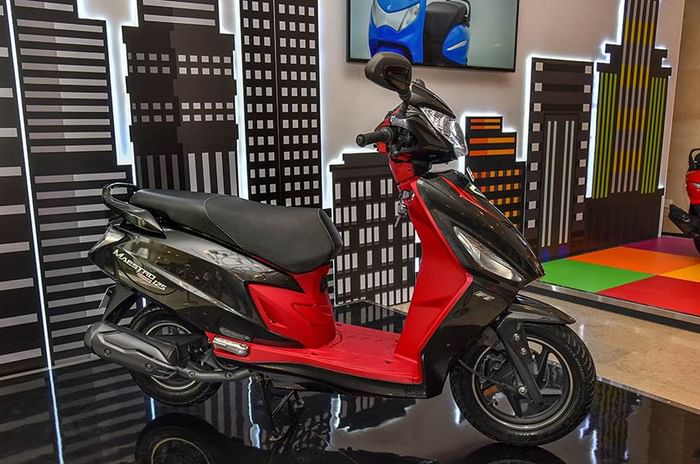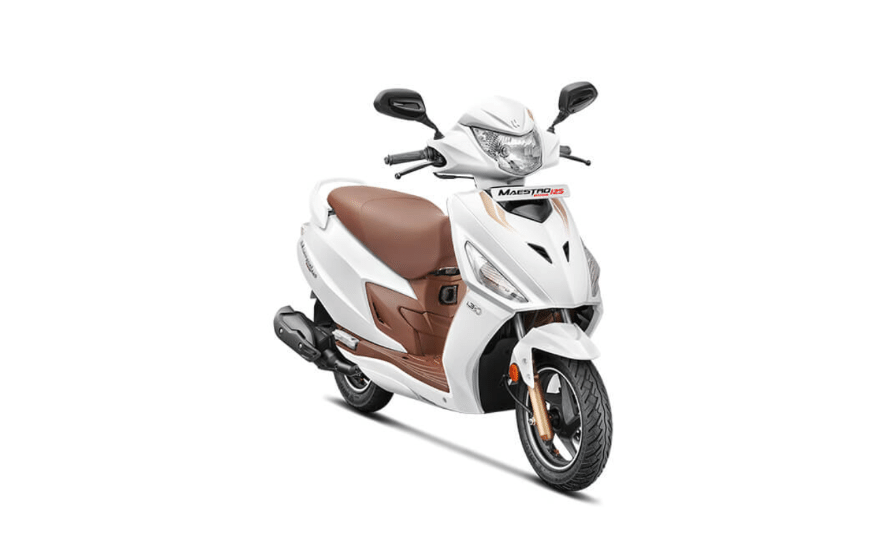2019 Hero Maestro Edge 125 review, test ride
Does the Maestro Edge 125 have what it takes to compete in the 125cc sporty scooter space?
Published on May 15, 2019 10:00:00 AM
37,293 Views
Follow us on



What is it?
The last few years have seen more and more 125cc scooters enter the list of top 10 highest-selling scooters in India. Nearly half of the list from February 2019 comprises 125s and that’s most certainly the biggest indicator of where the Indian scooter market is headed. Hero was quite late when it entered this segment with the Destini 125 in October 2018, but its second offering in the space, the Maestro Edge 125, has followed quickly. While the Destini has been positioned as a family scooter for a more mass-market appeal, the new Maestro, in Hero’s own words, is "designed for today’s young generation."
What does it look like?
At first glance, nothing on the scooter looks new, which is because it looks very similar to the Maestro Edge that first made its debut around four years back, in 2015. While some areas, like the side panels, tail-light and front cowl, have changed slightly, the scooter looks too similar to the standard Maestro that is now from a segment below it. The Maestro Edge 125 is the company’s new fuel-injection debuting, flagship offering, and it could and should have carried a more unique design, especially since many panels have been redesigned. Nevertheless, the styling it currently has doesn’t show its age as much as one would imagine. The well-styled bodywork, wide tail-light and sporty stance are to thank for this.

Hero has also tried livening up the styling by offering a dual-tone colour scheme, where the fuel-injected model in white features brown inner panels and the black sports bright red bodywork. To be honest, it is a pity that the FI model can’t be had in a single-tone scheme, like with the carburetted variant.

What features does it get?
As far as features go, the new Maestro misses out on LED lighting, but gains a unique, triangular DRL that sits below the numberplate holder. The scooter also features a semi-digital instrument cluster, an external fuel-filler cap, a USB charging port and an underseat light. However, it misses out on a brake lock clasp, a useful feature that you will find on much more affordable scooters. The 125 also comes with an exhaust muffler that looks far more conventional than the one on the regular Maestro Edge. The switchgear the scooter uses deserves special mention as it looks and feels upmarket. The carb variant of the Maestro Edge 125 features Hero’s auto start-stop tech called i3S, but the FI model doesn’t.
What is it like to ride?
The Maestro Edge 125 has nearly the same chassis as the existing Maestro Edge 110, resulting in similarly nimble and well-gauged handling. However, the small, 10-inch rear wheel translates to reduced stability, particularly, at high speeds. The scooter also changes direction quickly, and the MRF tyres it uses work really well. With a kerb weight of around 110kg, the Maestro Edge is not the lightest in its segment, but it is not the heaviest either. Interestingly, the carb version of the 125 has a slightly larger fuel tank, at 5.5 litres, compared to the 5 litre one on the FI model. Hero probably decreased the size of the tank in order to make room for the additional components that come with the FI system.

Towards the front, the scooter uses a telescopic fork and a 12-inch wheel, both segment-standard features. The ride quality on the Maestro Edge is decent – it feels firm, but doesn’t shake up the scooter on rough surfaces, except for really deep potholes. Similarly, the braking is decent too, but we would have liked a little more bite from the disc.
Luckily for Hero, the majority of buyers in this segment also value performance as highly as styling and features. These buyers will be happy to know that the 125 feels like a big step up from the 110 because of the additional power and the fuel-injection tech. The FI variant we spent our day riding makes 9.2hp, while the carb model produces a lower 8.8hp. The peak horsepower figures come in at different rpms as well, 7,000rpm on the FI and 6,750rpm on the carb model. Torque on both variants, meanwhile, remain the same – 10.2Nm at 5,000rpm. The Hero Maestro Edge 125 is India’s first scooter to use fuel-injection as a fuelling method.

While it doesn’t feel the quickest off the line, the Maestro Edge 125 does get going after around 20-30kph. It gets to 80kph with ease and we even witnessed a speedo indicated top speed of 95kph while sitting upright. The motor also feels noticeably more refined, thanks to the fuel-injection system. The scooter is free of vibrations, aside from minor ones present near the floorboard.

Should I buy one?
The Hero Maestro Edge 125 is available in three variants – a carburettor drum brake variant priced at Rs 58,500, a carburettor disc brake variant at Rs 60,000 and a fuel-injected variant at Rs 62,700. At these prices, it doesn’t undercut its rivals in typical Hero fashion, but it is priced on par with them. To give you an idea, prices for direct rivals like the TVS Ntorq 125 and Honda Grazia 125 start at Rs 58,262 and Rs 60,723, respectively (all prices, ex-showroom, Delhi). This could be detrimental to the Maestro Edge 125’s success because the TVS Ntorq 125 is, at present, the king of 125cc sporty scooters. That said, only a back-to-back comparison will reveal exactly how they stack up.
Tech Specs 
Copyright (c) Autocar India. All rights reserved.




 Wheels and Tyres
Wheels and Tyres Dimensions & Chassis
Dimensions & Chassis Price
Price Engine
Engine Suspension
Suspension Brakes
Brakes
Comments
Member Login
Personal Details
No comments yet. Be the first to comment.